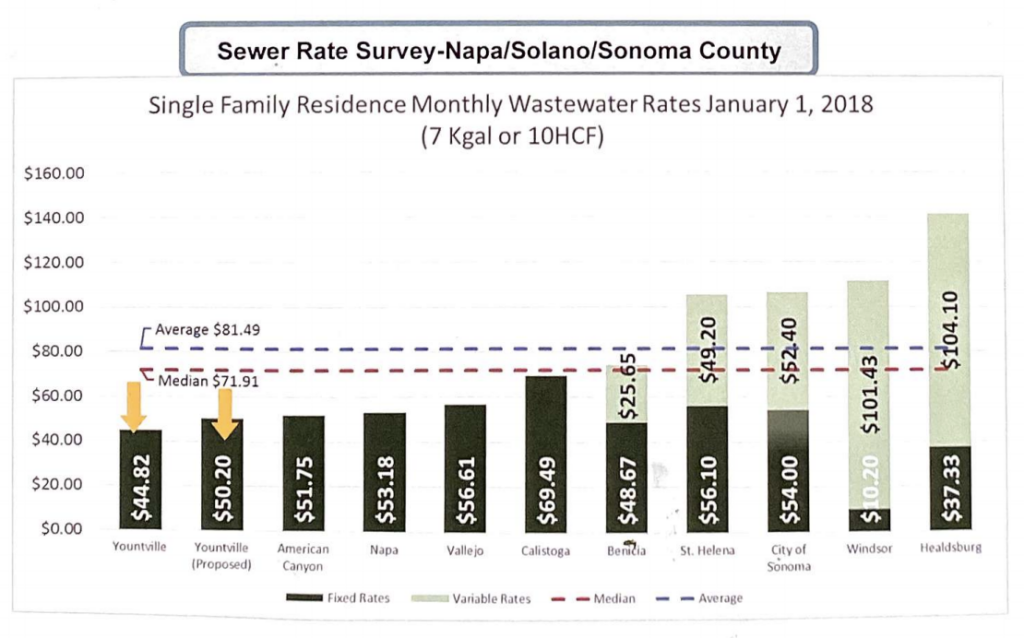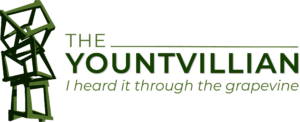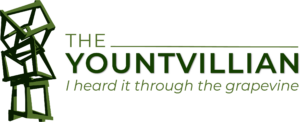Last week we discussed all things water, and this week, we will dive into wastewater (no pun, we don’t want you to that literally!) Wastewater is not something that most people think of daily, but it is just as crucial to a community’s health as clean drinking water. The goal of wastewater generated by the Town of Yountville is to treat water reused for irrigation purposes. After treatment, almost 70% of water irrigates five vineyards and one golf course. Promoting the sustainable use of recycled water allows groundwater for potable use during extreme drought conditions. And just as importantly, it keeps the overflow out of our creeks and waterways.
Unlike Yountville’s water, the Town of Yountville controls the wastewater treatment. The Public Works Department operates the Wastewater Collection System. They are responsible for the maintenance of the Wastewater Treatment Plant, 8.5 miles of sewer pipeline under the streets of Yountville, 770 sewer lateral connections, 0.75 miles of force main from the pump station, a duplex (two pumps) wastewater pump station, and associated level control, plus some other equipment needed to move wastewater up the hill to the treatment plant. All of our waste-water flows by gravity to the Peter J. Bardessono Memorial Pump Station and is then pumped to the Wastewater Treatment Plant (WWTP) to be treated. The WWTP, located at the southeastern town limit behind the driving range at Vintner’s Golf Course. The Town of Yountville maintains the collection system for all residential and commercial property in the Town limits with a few exceptions. Those exceptions include the internal collection system of the Veterans Home, the guard station on California Drive, the Napa Valley Museum, Domaine Chandon restaurant and tasting room, and the Cal-Fire Station 12 and Vintner’s Golf Course.
The Town of Yountville has seven recurring recycled water customers that are served by a 5.5 mile recycled water distribution system pipeline. These include six vineyards located along Silverado Trail. In addition, recycled water is utilized for the Vintner’s Golf Course which sits on leased land owned by the Veteran’s Home/State of CA and surrounds the Yountville Wastewater Reclamation Facility (WRF). Of the 110 million gallons of wastewater treated at the WRF, approximately 100 million gallons was beneficially reused for irrigation purposes of the golf course and vineyards. The Town also requires contractors to use recycled water for soil compaction and dust control instead of taking water from fire hydrants in Town which are directly tied to our precious domestic drinking water system. This offset approximately 1,000,000 gallons! The Town was able to beneficially reuse 90% of the total influent generated by the Town’s residents and businesses as well as the Veteran’s Home campus. The remaining 10% was discharged to the Napa River in full compliance with the National Pollutant Discharge Elimination System (NPDES) Permit issued and regulated by the CA State and SF Bay Regional Water Quality Control Boards.
Same as water, wastewater fees pay for The Water and Wastewater Utility Enterprise Fund. In Yountville, Enterprise Funds are used for town-operated utility services, such as water and wastewater. Residents and businesses paying for those utility services cover all costs associated with the utilities. Funding for the Enterprise Fund is through the rates that residents and businesses pay for Water and Wastewater. This is different from the General Fund, mostly financed through other taxes and fees. Fees collected by residents and businesses in Yountville are separated into several various funds.
- Wastewater Utility Operating Fund – accounts for wastewater revenue from user fees, operating expenses for collection of wastewater from customers and treatment of wastewater, including reclaimed water sold for outdoor uses.
- Wastewater Treatment Capital Fund – accounts for wastewater treatment plant capital improvements & acquisition of major equipment – costs are shared equally with the Veteran’s Home, with the Town’s share of funding generated by the wastewater operating Revenue
- Wastewater Collection Capital Fund – accounts for capital improvements of Town’s sewer collection system and related major equipment – funding generated by wastewater operating revenue
- Sewer Connection Impact Fee Fund – accounts for fees charged on residential & commercial development – funds allocated for capital infrastructure projects
Currently, residents are charged a fixed rate, and non-residential users are charged variable rates that vary by meter size. Non-residential volumetric rates include charges per 1,000 gallons (kgal) of water consumption for low, medium, and high strength users based on their impact on the wastewater system. Similar to the rate increase regarding water, The Town of Yountville has adopted a 5-year schedule of 12% annual rate increases from Fiscal Year 2018 through the Fiscal Year 2022. The final two years of proposed rate increases are projected to be implemented on January 1, 2021, and January 1, 2022, respectfully. Also, unlike with water, the current rate adjustments are predicted to generate sufficient funds to recover annual expenditures, meet debt service coverage requirements and maintain adequate reserve funds through FY 2022.

A 2020 analysis done by Bartle Wells Associates (BWA) found that The Town Yountville may be able to fulfill the wastewater revenue requirements with a rate increase LOWER than 12% depending on future capital project needs. However, Town Council chose to keep with the current 12% increase schedule. This Council made this decision in tandem because they decided NOT to increase water rates mid-cycle. The “math” worked well for the users of these Enterprise Funds in Yountville.
We have given you another technical article to understand better how wastewater and where your money is going. What are your questions and comments? Let us know here, and we can help us all to have a continued understanding of how our municipality works.
Attached is some documentation for further understanding the Town undergoes and reviews for wastewater rate decisions.
Water-Wastewater Report 2018
Wastewater Financial Plan Update
Oct. 6th 2020 Yountville Town Council Staff Report
Sewer System Management Plan 2020
2019 Annual Report for the Yountville Wastewater Reclamation Facility





